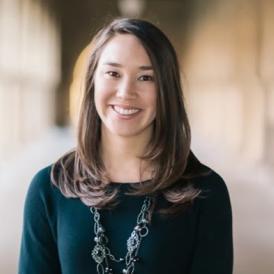
Sasha (Brophy) King
This year marks the tenth anniversary of BE’s departmental status. One of the elements necessary to gain this status was the approval by the MIT faculty of our undergraduate major —MIT’s first new undergraduate major in 30 years. Exactly ten years ago, two-dozen sophomore students began following the BE undergraduate curriculum roadmap for the very first time. Sasha (Brophy) King was one of those students in that first class of “Course 20” students.
Sasha (Brophy) King grew up in Cupertino, California, “back when Apple wasn’t cool.” She admits to being one of those children who liked to take things apart around the house. “I wanted to be a doctor too,” she adds. “I would examine my stuffed animals with my toy doctor's kit.” While attending Monta Vista High School she determined that bioengineering was what she wanted study in college. “I remember when I visited MIT, they said that they were planning to build a new major and that it would be ready for my year. That was the reason I applied to MIT, for the bioengineering program.”
Once at MIT, King had no reservations about choosing Course 20 as her major. “It felt exciting. I went to a few information sessions led by Doug Lauffenburger and Linda Griffith, and they were so passionate about this new program. Also, all of these top professors in the department were really excited to work with us; our first class could be part of building the program.”
After graduation King took a job at Fletcher Spaght, a life science consulting and venture capital fund. She found out about the company while attending an information session meant for BE graduate students. “Even though the Course 20 major was a new program, the BE graduate program had been around for a while, so there was great departmental programming available to my class.”
At Fletcher Spaght, Sasha decided to formalize her business education. She returned to academia and received her MBA from Stanford University.
Now, King is the global strategy manager at Ariosa Diagnostics (San Jose, California); a clinical genetic company that is currently doing prenatal screening. “The education of Course 20, where I learned fundamentals of mechanical engineering, electrical engineering and computer science and biology, I found highly valuable, particularly while working within an operating company. Life science companies are not pure biology or pure mechanical engineering anymore. In BE, I was able to get a broad view of all of these forms of engineering that are necessary to create a company that does bioengineering.”
King looks back fondly at her time as a Course 20 student. One subject in particular still stands out; 20.109–Laboratory Fundamentals in Biological Engineering. She is thrilled to know that it is still being taught. “It still exists? It does? Excellent! That class I really loved. In any UROP you learn laboratory skills, in ‘109’ you learned a broad range laboratory skills. I work in a laboratory-based company, the ‘109’ training is valuable.”
Sasha (Brophy) King is happy to speak with any Course 20 students who may benefit from learning more about her professional development and career choices.


